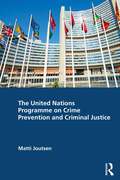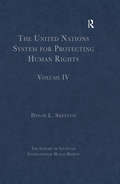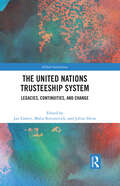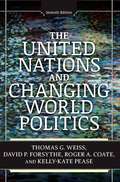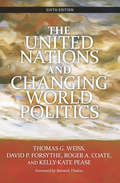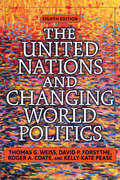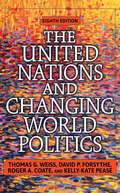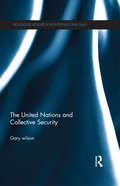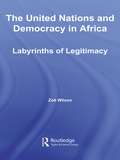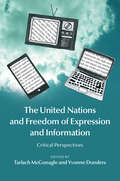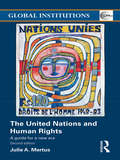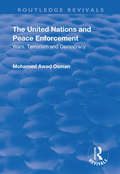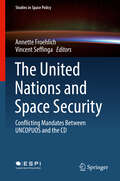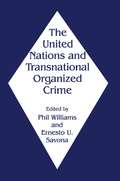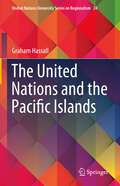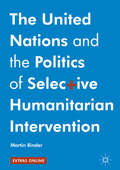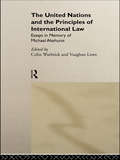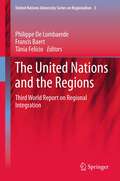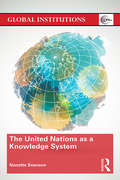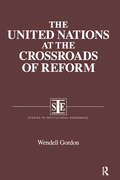- Table View
- List View
The United Nations Programme on Crime Prevention and Criminal Justice
by Matti JoutsenThis book documents the evolution of the United Nations (UN) Crime Programme and its changing priorities, from the early focus on juvenile delinquency and correctional treatment, to the present preoccupation with transnational organized crime. It analyses what factors have contributed to this evolution, and to the shift from the original work on “soft law” resolutions and international standards, to “hard law” conventions, and to the expansion of technical assistance. It also examines the changing structure and working methods of the Programme, such as the UN Crime Commission and the UN Secretariat unit responsible for the Programme, the UN Crime Congresses, and the Programme Network Institutes. Drawing on almost 50 years of experience on the “inside” of the UN Crime Programme and his hands-on knowledge of the working of governmental and intergovernmental processes, Matti Joutsen explores the transitions that have taken place in the UN Crime Programme over the seven decades of its existence, assesses the changing impact of the Programme, and suggests possible future directions in international cooperation in crime prevention and criminal justice.An accessible and compelling read, this book will appeal to students and scholars of criminology, sociology, politics, criminal justice, policy makers, and those interested in the evolution of the UN Crime Programme.
The United Nations Security Council in the Age of Human Rights
by Jared Genser Bruno Stagno UgarteThis is the first comprehensive look at the human rights dimensions of the work of the only body within the United Nations system capable of compelling action by its member states. Known popularly for its failure to prevent mass atrocities in Rwanda, the former Yugoslavia, and Syria, the breadth and depth of the Security Council's work on human rights in recent decades is much broader. This book examines questions including: how is the Security Council dealing with human rights concerns? What does it see as the place of human rights in conflict prevention, peacemaking and peacekeeping? And how does it address the quest for justice in the face of gross violations of human rights? Written by leading practitioners, scholars and experts, this book provides a broad perspective that describes, explains and evaluates the contribution of the Security Council to the promotion of human rights and how it might more effectively achieve its goals.
The United Nations System for Protecting Human Rights: Volume IV (The Library of Essays on International Human Rights)
by Dinah L. SheltonThe United Nations has been at the forefront of developing the international law of human rights for nearly seven decades. This volume brings together the leading research articles on the development of human rights law by the United Nations and also includes essays on issues relating to standard-setting, institutional evolution, and the creation of monitoring procedures.
The United Nations Trusteeship System: Legacies, Continuities, and Change (Global Institutions)
by Maria Ketzmerick Jan Lüdert Julius HeiseThis book considers the past and present legacies, continuities and change of the United Nations Trusteeship System by assessing consequences and legacies of decolonization in contemporary society, international organizations, and international politics. International contributors address the UN Trusteeship System as a venue for multiple state and non-state actors and its effect on the international system. Rather than viewing UN trusteeship as a bygone phenomenon the volume underscores its current relevance, particularly in view of the recent resurgence of trusteeship models such as in Kosovo and East Timor. Offering a novel and robust, yet simple and intuitive analytical framework through which to understand a broad range of cases related to the trusteeship system and its impact on the international system the book places emphasis on the agency of states in the global South and highlights the importance of multiple actors in global governance. It will be of interest to scholars of international relations theory and history in a variety of fields, ranging from African Politics, to Intergovernmental Organizations and Comparative Politics.
The United Nations and Changing World Politics
by Kelly-Kate Pease David P Forsythe Thomas G Weiss Roger A CoateThis completely revised and updated seventh edition serves as the definitive text for courses in which the United Nations is either the focus or a central component. Built around three critical themes in international relations--peace and security, human rights, and humanitarian affairs--the seventh edition of The United Nations and Changing World Politics guides students through the complexity of politics and almost seven decades of UN activities. Students of all levels will learn what the UN is, how it operates, and what its relationships are with the universe of external actors and institutions, from sovereign states to the plethora of nongovernmental and intergovernmental organizations now playing important roles in world politics. This new edition is fully revised to take into account recent events, including the UN's actions in Libya and Syria, the tenure of Ban Ki-moon, the global economic and financial meltdown, and efforts to confront nuclear proliferation and climate change.
The United Nations and Changing World Politics
by Kelly-Kate Pease David P Forsythe Thomas G Weiss Roger A CoateWith updates throughout, this newly revised sixth edition serves as the definitive text for courses on the United Nations. Built around three critical themes in international relations-international peace and security, human rights and humanitarian affairs, and building peace through sustainable development-The United Nations and Changing World Politics guides readers through the complexity of politics and history of the UN. Students of all levels will learn what the UN is, how it operates, and what its relationships are with external actors and institutions, from sovereign states to nongovernmental and intergovernmental organizations now playing important roles in world politics. Featuring a new chapter on evolving security operations and a new foreword by Ramesh Thakur, the sixth edition includes updated discussions of the UN's actions in Darfur and Chad, the tenure of Ban Ki-moon, and the global economic and financial meltdown.
The United Nations and Changing World Politics
by Kelly-Kate Pease David P Forsythe Thomas G Weiss Roger A CoateWith updates throughout, this newly revised sixth edition serves as the definitive text for courses on the United Nations. Built around three critical themes in international relations-international peace and security, human rights and humanitarian affairs, and building peace through sustainable development-The United Nations and Changing World Politics guides readers through the complexity of politics and history of the UN. Students of all levels will learn what the UN is, how it operates, and what its relationships are with external actors and institutions, from sovereign states to nongovernmental and intergovernmental organizations now playing important roles in world politics. Featuring a new chapter on evolving security operations and a new foreword by Ramesh Thakur, the sixth edition includes updated discussions of the UN's actions in Darfur and Chad, the tenure of Ban Ki-moon, and the global economic and financial meltdown.
The United Nations and Changing World Politics
by Thomas G. Weiss Roger A. Coate Kelly-Kate Pease David P ForsytheThis completely revised and updated eighth edition serves as the definitive text for courses in which the United Nations is either the focus or a central component. Built around three critical themes in international relations-peace and security, human rights and humanitarian affairs, and sustainable human development-the eighth edition of The United Nations and Changing World Politics guides students through the seven turbulent decades of UN politics.This new edition is fully revised to incorporate recent developments on the international stage, including new peace operations in Mali and the Central African Republic; ongoing UN efforts to manage the crises in Libya, Syria, and Iraq; the Iran Nuclear Deal; and the new Sustainable Development Goals. The authors discuss how international law frames the controversies at the UN and guides how the UN responds to violence and insecurity, gross violations of human rights, poverty, underdevelopment, and environmental degradation. Students of all levels will learn that the UN is a complex organization, comprised of three interactive entities that cooperate and also compete with each other to define and advance the UN's principles and purposes.
The United Nations and Changing World Politics
by David P. Forsythe Thomas G. Weiss Roger A. Coate Kelly-Kate PeaseThis completely revised and updated seventh edition serves as the definitive text for courses in which the United Nations is either the focus or a central component. Built around three critical themes in international relations--peace and security, human rights, and humanitarian affairs--the seventh edition of The United Nations and Changing World Politics guides students through the complexity of politics and almost seven decades of UN activities. Students of all levels will learn what the UN is, how it operates, and what its relationships are with the universe of external actors and institutions, from sovereign states to the plethora of nongovernmental and intergovernmental organizations now playing important roles in world politics. This new edition is fully revised to take into account recent events, including the impact of the global financial crisis and recession on international politics, UN actibvities related to peacekeeping and natural disasters, the UN’s actions in Libya and Syria and the Arab Spring, the tenure of Ban Ki-moon, Rio+20, and the Iranian nuclear issue.
The United Nations and Changing World Politics
by Thomas G. WeissThis completely revised and updated eighth edition serves as the definitive text for courses in which the United Nations is either the focus or a central component. Built around three critical themes in international relations?peace and security, human rights and humanitarian affairs, and sustainable human development?the eighth edition of The United Nations and Changing World Politics guides students through the seven turbulent decades of UN politics.This new edition is fully revised to incorporate recent developments on the international stage, including new peace operations in Mali and the Central African Republic; ongoing UN efforts to manage the crises in Libya, Syria, and Iraq; the Iran Nuclear Deal; and the new Sustainable Development Goals. The authors discuss how international law frames the controversies at the UN and guides how the UN responds to violence and insecurity, gross violations of human rights, poverty, underdevelopment, and environmental degradation. Students of all levels will learn that the UN is a complex organization, comprised of three interactive entities that cooperate and also compete with each other to define and advance the UN's principles and purposes.
The United Nations and Changing World Politics: Revised And Updated With A New Introduction
by Thomas G. WeissThis completely revised and updated eighth edition serves as the definitive text for courses in which the United Nations is either the focus or a central component. Built around three critical themes in international relations (peace and security, human rights and humanitarian affairs, and sustainable human development) the eighth edition of The United Nations and Changing World Politics guides students through the seven turbulent decades of UN politics. This new edition is fully revised to incorporate recent developments on the international stage, including new peace operations in Mali and the Central African Republic; ongoing UN efforts to manage the crises in Libya, Syria, and Iraq; the Iran Nuclear Deal; and the new Sustainable Development Goals. The authors discuss how international law frames the controversies at the UN and guides how the UN responds to violence and insecurity, gross violations of human rights, poverty, underdevelopment, and environmental degradation. Students of all levels will learn that the UN is a complex organization, comprised of three interactive entities that cooperate and also compete with each other to define and advance the UN's principles and purposes.
The United Nations and Collective Security (Routledge Research in International Law)
by Gary WilsonThe role of the United Nations in collective security has been evolving since its inception in 1945. This book explores collective security as practiced within the legal framework provided by the United Nations Charter, with a particular focus upon activity undertaken under the auspices of the UN Security Council, the body conferred by the Charter with the primary responsibility for the maintenance of international peace and security. Although the book is primarily grounded in international law, where appropriate it also draws upon relevant political insights in order to present a clear picture of the UN collective security system in operation and the factors which impact upon the way in which it functions. Offering a comprehensive analysis it considers the full range of measures which can be utilised by the UN in the performance of its collective security remit including military enforcement action, peacekeeping, non-military sanctions and diplomacy. The book considers each of these measures in detail, assessing the legal framework applicable to the form of action, the main legal controversies which arise in respect of their appropriate utilisation, and the UN’s use of this collective security ‘tool’ in practice. The book draws conclusions about the main strengths and shortcomings of the various means through which the UN can attempt to prevent, minimise or end conflict.
The United Nations and Democracy in Africa: Labyrinths of Legitimacy (Studies in International Relations)
by Zoë WilsonThis book explores UN bureaucracy and the development dysfunction it sows in four 'most different' African countries: Angola, Botswana, Namibia, and Tanzania. Wilson's original purpose for researching this book was to uncover new solutions to some of the United Nations' most vexing implementation problems. Yet, as research unfolded, it became clear that the reasons for those problems lay tangled up in bureaucratic and philosophical quagmires of a much more fundamental nature. The United Nations and Democracy in Africa is the documentation not only of these bureaucratic and philosophical absurdities that find expression through development practice, but also the journey of the author from ardent defender of the UN to profound sceptic.
The United Nations and Freedom of Expression and Information
by Mcgonagle, Tarlach and Donders, Yvonne Tarlach Mcgonagle Yvonne DondersThere are a multitude of UN legal instruments which pertain to the rights of freedom of expression and information, and this book is the first to comprehensively map them and their function. It details the chequered history of both rights within the UN system and evaluates the suitability of the system for overcoming contemporary challenges and threats to the rights. Leading scholars address key issues, such as how the rights to freedom of expression and information can come into conflict with other human rights and with public policy goals, such as counter-terrorism. The book's institutional focus comprises five international treaties, UNESCO and the UN Special Rapporteur on freedom of expression. Relevant for academics, lawyers, policy-makers and civil society actors, it also examines how new communication technologies have prompted fresh thinking about the substance and scope of the rights to freedom of expression and information.
The United Nations and Human Rights: A Guide for a New Era
by Julie A MertusJulie Mertus’ highly acclaimed text continues to be the only completely up-to-date comprehensive yet succinct guide to the United Nations human rights system. Today, virtually all UN bodies and specialized agencies are undertaking efforts to incorporate the promotion or protection of human rights into their programs and activities. The United Nations and Human Rights examines these recent initiatives within the broader context of human rights practice, including the promotion of individual rights, management of international conflict and the advancement of agendas of social movements. The fully revised and updated second edition not only provides a complete guide to the development, structure and procedures within the UN human rights system, but also reflects the vital changes that have occurred within the UN system, devoting considerable attention to expanding the range of issues discussed, including: new developments in the Office of the High Commissioner for Human Rights the current controversy surrounding the new Human Rights Council expanded treatment of economic and social rights. A superb addition to any human rights syllabus, this book maintains its position as essential reading for students and practitioners of human rights, international relations and international law.
The United Nations and Peace Enforcement: Wars, Terrorism and Democracy (Routledge Revivals)
by Mohamed Awad OsmanThis title was first published in 2002.This original text studies the UN system for the maintenance of international peace and security in the face of threats to the peace, breaches of the peace and acts of aggression. It assesses the Security Council attempts to employ enforcement measures under Chapter VII of the UN Charter in response to inter-state and intra-state conflicts, paying attention to the effect of the Council's increasing involvement in internal situations, both on the development of the system and on the outcome of conflicts. Filling a notable lacuna in contemporary literature, Mohamed Osman studies peace enforcement on its own and within an independent theoretical and empirical framework. The book will appeal both to students of the UN and humanitarian intervention, but also to international lawyers and political philosophers concerned with questions of intervention and sovereignty. In addition, its detailed case studies make the volume an excellent reference tool.
The United Nations and Space Security: Conflicting Mandates between UNCOPUOS and the CD (Studies in Space Policy #21)
by Annette Froehlich Vincent SeffingaThis book provides a detailed analysis on the history and development of the Committee on the Peaceful Uses of Outer Space (UNCOPUOS) and the Conference on Disarmament (CD) and the coordination and cooperation between these two fora. Furthermore, it discusses the future challenges that these fora will have to deal with and conclude in which way the current system can change to cope with the evolution of space matters. This is necessary for the proper discussion of space matters because these matters cannot simply be divided between military and non-military, but are interrelated.
The United Nations and Transnational Organized Crime
by Phil Williams Ernesto U. SavonaTransnational organized crime poses a serious threat to the international community. This volume, the product of a UN conference, discusses the dangers of transnational organized crime and identifies forms of regional, national and international co-operation for its prevention and control, including intelligence networks, preventive strategies, extradition treaties, criminalizing participation in criminal organizations and the elaboration of an international convention. The reduction and subsequent containment of transnational organized crime require governments not only to recognize the seriousness of the challenge, but also to allocate resources commensurate with this challenge. The authors warn that should the international community fail to do this, the prospects for democratic government and the rule of law will be gloomy.
The United Nations and the Pacific Islands (United Nations University Series on Regionalism #24)
by Graham HassallThis book critically examines the relationship between the United Nations Organization and the small states of the Pacific islands. It provides an in-depth coverage of the United Nations, coupled with how Pacific Small Island Developing States interact. It covers three themes, the first one being the position of the UN on the Pacific Islands, which examines the role of the many UN organs, agencies and programs in strengthening individual countries and the region as a whole. It examines the manner in which the UN’s activities have benefited Pacific nations, territories and peoples. The second theme deals with the Pacific states in the UN, and examines the participation of Pacific nations and territories in the UN’s various organs, agencies, and programmes. It analyses the contribution they have made to the effectiveness of the organization, as distinct from the benefits they have sought to gain from it. The third and last theme deals with small states in global public policy, taking a broader look at how small states are faring within the UN system in the age of global discourse on shared public goods/public policy concerns.
The United Nations and the Politics of Selective Humanitarian Intervention
by Martin BinderThis book offers the first book-length explanation of the UN's politics of selective humanitarian intervention. Over the past 20 years the United Nations has imposed economic sanctions, deployed peacekeeping operations, and even conducted or authorized military intervention in Somalia, Bosnia, or Libya. Yet no such measures were taken in other similar cases such as Colombia, Myanmar, Darfur--or more recently--Syria. What factors account for the UN's selective response to humanitarian crises and what are the mechanism that drive--or block--UN intervention decisions? By combining fuzzy-set analysis of the UN's response to more than 30 humanitarian crises with in depth-case study analysis of UN (in)action in Bosnia and Darfur, as well as in the most recent crises in C#65533;te d'Ivoire, Libya and Syria, this volume seeks to answer these questions.
The United Nations and the Politics of Selective Humanitarian Intervention
by Martin BinderThis book offers the first book-length explanation of the UN’s politics of selective humanitarian intervention. Over the past 20 years the United Nations has imposed economic sanctions, deployed peacekeeping operations, and even conducted or authorized military intervention in Somalia, Bosnia, or Libya. Yet no such measures were taken in other similar cases such as Colombia, Myanmar, Darfur—or more recently—Syria. What factors account for the UN’s selective response to humanitarian crises and what are the mechanism that drive—or block—UN intervention decisions? By combining fuzzy-set analysis of the UN’s response to more than 30 humanitarian crises with in depth-case study analysis of UN (in)action in Bosnia and Darfur, as well as in the most recent crises in Côte d’Ivoire, Libya and Syria, this volume seeks to answer these questions.
The United Nations and the Principles of International Law: Essays in Memory of Michael Akehurst
by Vaughan Lowe Colin WarbrickWith the fall of communism and the appearance of a new world order, it is hoped that the United Nations will become the principle organisation for the regulation of relations between states as well as for the settlement of conflict. The recent crises over Iraq and the continued bloodshed in the former Yugoslavia have ensured a higher profile for the United Nations but have at the same time placed great pressure on that organisation to resolve conflict and organise relations between states in a manner that is acceptable to the international community.The essays collected in this volume are published in conjunction with the International Law Group. Providing valuable statements of the fundamentals of international law from leading authorities, they re-examine the Declaration of Principles of International Law Governing Friendly Relations Between States. The Declaration is the nearest thing that states have to an international constitution and embodies the fundamental values of the international legal system. The great changes in the international system since 1989 hold out the prospect of the reinvigoration of the Charter, perhaps for a new system of international legal relations, and make the reconsideration of the Declaration particularly timely.
The United Nations and the Regions: Third World Report on Regional Integration
by Francis Baert Tânia Felício Philippe LombaerdeThis unique book investigates the implications of the rising importance of supra-national regional organizations for global governance in general, and for the United Nations, in particular. It touches upon issues such as regional representation at the UN, high-level dialogues with regional organisations, as well as the coordination of UN member states' voting behaviour in the UN General Assembly and the UN Security Council. The book further explores the regional dimension and coordination of UN operations in areas such as peace and security, human rights, and sustainable development. The contributions to the book are both in-depth chapters and shorter viewpoints, written by a combination of academics, policy-makers at regional organizations, and experts from international think tanks. The book is essential reading for anyone interested in the future of global governance.
The United Nations as a Knowledge System (Global Institutions)
by Nanette SvensonThis book seeks to explore how the UN has generated, warehoused, disseminated, structured, packaged, expanded, transferred and leveraged its vast resources of accumulated information and experience throughout the decades and, particularly, since the start of the 21st century with the introduction of more connective information and communications technology. It examines the overarching objectives that have guided such activity and divides UN knowledge management into three distinct, but often overlapping and intertwining, categories: knowledge for social and organizational learning; knowledge for norm setting; and knowledge for creation of products and services. Svenson brings together these multiple aspects of UN knowledge management to present a holistic view of how the organization utilizes its global intelligence to educate, advocate and serve member countries’ development. Instead of looking at the UN as an international bureaucracy or as a peacekeeping, policymaking, humanitarian or development entity, this work studies the UN as a generator and purveyor of information, learning and experience in all of these areas. This book will be key reading for all students and scholars of international organizations.
The United Nations at the Crossroads of Reform
by Wendell GordonThis study presents a case for the reform of the United Nations and discusses possible measures for enforcing peace worldwide. There are separate chapters on such topics as the General Assembly, Security Council, the Secretary-General and the Secretariat, and the International Court of Justice.
